Ghalibaf Re-Elected As Iran’s Parliament Speaker For Fourth Successive Time
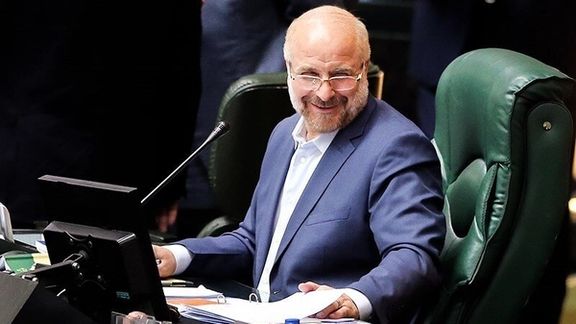
Mohammad Bagher Ghalibaf was re-elected as the speaker of Iran's parliament for the fourth consecutive year.

Mohammad Bagher Ghalibaf was re-elected as the speaker of Iran's parliament for the fourth consecutive year.
On Tuesday, 210 out of 290 members of parliament voted for Ghalibaf's re-election, a 10-percent increase compared to the 2022 elections where he won only 193 votes in his worst-ever performance.
Ghalibaf has yet to enjoy the support he received during his first two rounds in 2020 and 2021, when he was supported by 230 MPs in both elections.
Former parliament speaker Ali Larijani won the highest number of votes in all annual elections with 237 votes cast for him in 2016. The lowest number was 140 votes cast in favor of Akbar Hashemi Rafsanjani in the second year of the first round of the parliament in Iran in 1980.
Larijani also holds the record of longest-serving speaker in Iran's parliament, in power for 12 consecutive years from 2008 to 2020.
During the Tuesday elections, hardline deputy speaker Abdolreza Mesri won re-election, but the second deputy speaker, Ali Nikzad lost his seat to Mojtaba Zolnouri in a fierce competition which ended in a tie. The decision was made by drawing lots.
While Ghalibaf won enough votes this year to remain in power as the Majlis speaker, he is expected to face a tough competition in 2024 parliamentary elections, which is vital if he seeks to realize his long-time dream of presidency in the 2025 presidential elections.
There are reports that hardliner parties Paydari and Sharian aim to knock Ghalibaf out of the Majles to send him the firm message that Ebrahim Raisi will serve a second term as Iran's President and there is no chance for Ghalibaf.

A moderate conservative politician says the ultraconservative Paydari Party has occupied most power centers including the parliament and the state television.
Former lawmaker Mansour Haghighatpour told Etemad Onlinethat the "audacious Paydari Party" has a lot of money, controls several powerful institutions and has seized and occupied the state television silently.
Haghighatpour is close to Iran’s former conservative parliament (Majles) speaker Ali Larijani who recently had a public run-in with ultraconservatives or hardliners.
Meanwhile, referring to the great number of Paydari members at the Iranian parliament, Haghighatpoor said “had the Guardian Council not disqualified” moderate and reform-minded candidates in the previous parliamentary elections, debates at the Majles would have replaced the nationwide protests that rocked Iran last year.
The Guardian Council, which screens candidates for elections, disqualified hundreds of non-hardliners in the 2020 Majles elections. The Council is under the control of Iran’s ruler Ali Khamenei.
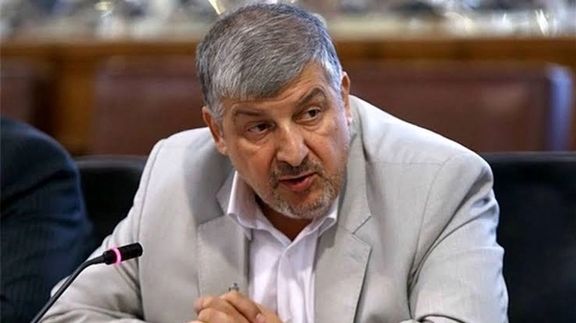
He added that Iran's ultraconservatives see themselves as the only revolutionary force in the country and call others spies and seditionists. He further said that the Paydari Party has access to money and media and has spent a lot of money on garnering support on social media.
"They have been given privileged access to funds, political power and media although they are just two busloads of politicians," Haghighatpoor said.
The moderate conservative politician added that when President Ebrahim Raisi took office in 2021, he did not have his own team to form the cabinet. Paydari promised to provide the team from its ranks. However, introduced to Raisi were a bunch of ineffective and unqualified individuals. He said the former Planning and Budget chief and the ministers who have been since removed from their posts show how inefficient Paydari's men are.
Haghioghatpoor predicted that the inefficiency of the Raisi administration and the parliament, both of which are dominated by Paydari, are likely to lead to lacklustre parliamentary elections with a low turnout in March 2024, if the same individuals are the only ones who are allowed to run.
At the same time, some in Iran say that hardliners campaignedincessantly in recent months to have Ali Shamkhani removedas secretary of the national security council. He was replaced by a Revolutionary Guard officer seen as ideologically in sync with Paydari.
Paydari's grip on the state television has also been strengthened during the past years after Payman Jebelli was appointed as the organization's chief. Jebelli chose Vahid Jalili of Paydari as his deputy for television and the latter appointed several party members as the heads of the broadcaster's key channels. This is going to give Paydari the upper hand in the next parliamentary elections in March as there are no private channels in Iran and the state television has exclusive broadcasting rights based on the country's Constitution.
Referring to a letter from Majles Speaker Mohammad Bagher Ghalibaf to the leaders of Paydari, in which the speaker explained how Paydari members have obstructed the parliament's operations, Haghighatpoor charged that the ultraconservative party has recently increased its activities against Ghalibaf. He said Ghalibaf is likely to have to pay a high price as a result of the tensions created by Paydari members.
Haghighatpoor's statements against Paydari Party came on the same day that the media were speculating on the fate of the election to form the parliament's last presidium in its four-year term of office.
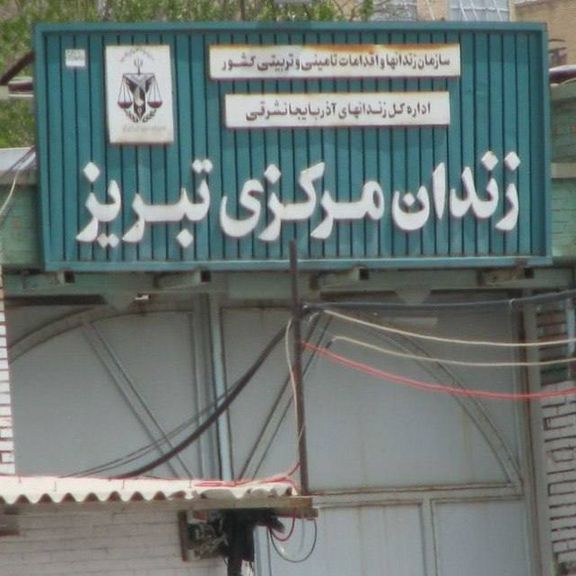
An Iranian prisoner on death row has died of cardiac arrest caused by the stress of imminent execution, a rights group reported.
Milad Bahmanzadeh, who had been convicted of murder and sentenced to death, died of a heart attack in Tabriz prison northwest of Iran because of the huge stress and anxiety of his possible execution, Hengaw Organization reported.
Bahmanzadeh lost his life on Sunday, hours after he was transferred to the special ward where prisoners on death row are held.
Over the past few weeks, the Islamic Republic has hanged dozens of prisoners, including protesters, as part of an execution spree widely condemned by the international community.
The number of executions in Iran started to rise after President Ebrahim Raisi – the former head of the country’s notorious judiciary -- took office in August 2021 but the recent exponential spike has triggered concern at home and abroad.
The United Nations said earlier this month that Iran has executed 209 people so far this year, calling the record "abominable". The number has further grown in recent days, particularly with the regime's execution of three political prisoners Majid Kazemi, Saleh Mirhashemi and Saeed Yaghoubi.
Last week Amnesty International condemned the execution spree, and said it "opposes the death penalty in all cases without exception, regardless of the nature or circumstances of the crime; guilt, innocence or other characteristics of the individual; or the method used by the state to carry out the execution."
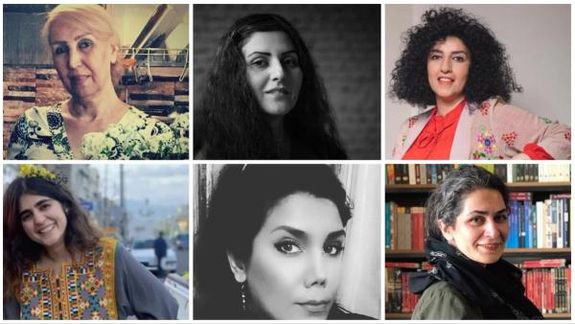
A group of female political prisoners in Tehran’s Evin Prison staged a sit-in to protest recent executions, saying the regime wants to frighten people into submission.
“The regime is taking revenge for the revolutionary movement by executing and killing people,” human rights activist Narges Mohammadi told inmates who gathered Saturday evening at the courtyard of the women’s ward to protest the execution of three political prisoners in Esfahan Friday.
Mohammadi argued that unlike the 1980s when the regime executed thousands of political prisoners to establish and stabilize its tyranny, the recent executions will only strengthen the people’s determination to overthrow the Islamic Republic.
Majid Kazemi, Saeed Yaghoubi and Saleh Mirhashemi were handed down the death sentence in a trial condemned as a travesty of justice by human rights campaigners, who say the prisoners were tortured into confessions, and there is no reliable evidence against them.
The three men were convicted over the death of two IRGC’s Basij militia members and a police officer during protests last November in Esfahan. Leaked audio from police radio chatter from the night the three regime agents were killed indicates that they were shot by friendly fire of plainclothes forces. The accused even had alibis for the time the agents were killed, with the family of one of the victims claiming there was CCTV video footage of their son at work.
Friday's executions brought to at least seven the number of protesters hanged since the beginning of the nationwide protests last September, which turned into one of the boldest challenges to the clerical rulers since the 1979 revolution. The protests were ignited by Mahsa Amini's death in the custody of Iran's morality police.
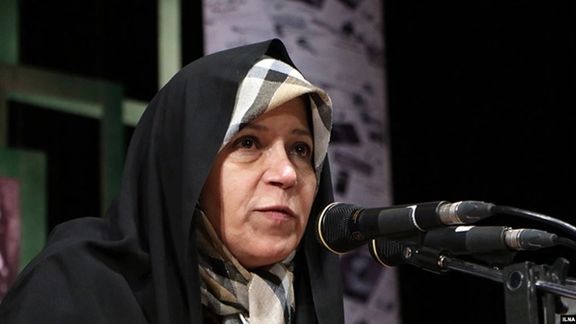
“Execution and taking people’s lives has turned into a despicable everyday practice in the Islamic Republic,” Faezeh Hashemi, the daughter of former President Akbar Hashemi-Rafsanjani said at the same gathering. “Execution of three protesters in Esfahan [last week], two in Tehran [in December], executions of 209 in five months, 580 in one year, 14 executions in one day, 22 executions in two weeks…,” she went on to say.
Hashemi accused the regime of using executions to “shut the mouths of critics and dissidents and to escape accountability over the appalling situation in the country” and it also signals the regime’s fear of the people.
She denounced executions “under any pretext, including for impertinence against the prophet, insult against sanctities, taking up arms against the regime, blasphemy, corruption on earth and even for drug trafficking” because, she said, “justice has been taken to the slaughterhouse”.
Hashemi, a former lawmaker who launched Zan daily for women during the presidency of reformist President Mohammad Khatami in late 1990s, is an outspoken critic of Supreme Leader Ali Khamenei.
Activists and politicians at home and abroad, as well as family members of protesters killed by the regime have extensively condemned the recent executions. Several neighborhoods in the capital Tehran, Esfahan and in a few other cities were scenes of protests against the regime’s executions last week. Students at universities across Iran also staged demonstrations.
Over 170 activists and politicians in Iran in a joint statement released Sunday dubbed the executions a “systematic murder by the government and demanded the immediate annulment of all death sentences.
A group of political prisoners including reformist politician Mostafa Tajzadeh, also an outspoken critic of Khamenei, said in a separate statement that the regime is using executions “as a tool of suppression and to cover up political, economic and social challenges and crises.”
Friday’s executions also sparked outrage among Western governments and people around the world.

Israel accused Iran's Revolutionary Guard (IRGC) on Monday of turning commercial ships into platforms for launching missiles, drones and commandos.
Defense Minister Yoav Gallant added the objective was to spread Tehran's clandestine naval clout well beyond the Persian Gulf.
The allegation came as tensions between the regional foes surge afresh over Iran's nuclear drive of uranium enrichment and support for Palestinian and Lebanese militias.
Showing images of six purportedly repurposed Iranian vessels, five of them named, Gallant told the Herzliya Conference security forum that these were "floating terror bases" and that one had recently sailed toward the Gulf of Aden.
"This follows directly on the maritime terrorism Iran has been imposing on the Persian Gulf and Arabian Sea. It is working to expand its activity to the Indian Ocean, too, and later to the Red Sea and to the Mediterranean Sea as well," Gallant said.
Iran has seized dozens of commercial vessels since 2019 in around the Persian Gulf waters, often with the aim of gaining leverage against other countries, such as South Korea and Greece.
Gallant said, “The [Iranian plan] is a concerning, 'pirate policy'. Iran is conducting itself like a collection of criminal organizations and not a modern state. The floating terror bases are an extension of Iran’s ongoing maritime terrorism, as seen in its actions in the Persian Gulf and Arabian Sea."
"Iran aims to expand its reach to the Indian Ocean, the Red Sea and even the shores of the Mediterranean. This is a structured plan designed to threaten trade and flight routes – both military and civilian – and to create a permanent threat in the maritime arena,” he added.
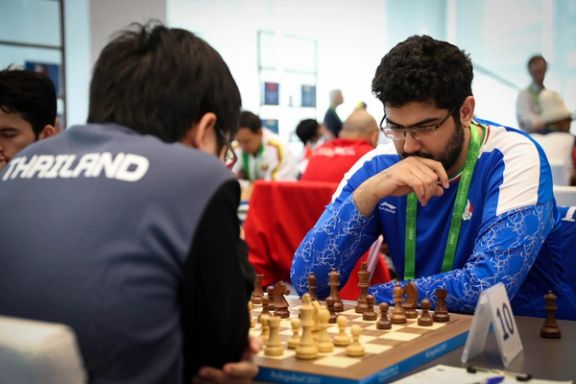
Pouya Idani, Iran's chess grandmaster, emigrated to France due to some "problems" including "difficulty in accessing the main chess websites," because of Iran's Internet restrictions.
Iran’s local media announced on Monday that the chess player “does not intend to change his citizenship and has only gone to France to live there.”
Iran Varzeshi daily claimed that Idani is going to play for the Iranian national team in the upcoming Asian Games.
"The playing conditions are more suitable for me in France and I am closer to the tournaments and leagues there," the daily quoted Idani as saying.
"I had problems in Iran, and it was difficult for me to continue competing. It was difficult for us to access some main chess sites. Even other players such as Mohammad Amin Tabatabai and Parham Maqsoudlou face the same conditions. I hope this situation will improve."
As nationwide anti-regime protests began in September, the government started to disrupt access to the internet to prevent news about the unrest being disseminated both inside the country and abroad.
Idani was awarded the title of Grandmaster by FIDE in 2014. He won the World U18 chess Championship in 2013. He is the second-best chess player in Iran as of June 2021.
Over 30 Iranian athletes have defected in recent years, seeking asylum in other countries.
In addition to dress code restrictions, another issue forcing Iranian athletes to defect is Tehran’s policy of not allowing them to compete against Israelis.
Many Iranian athletes have also displayed solidarity with the 2022 protest movement at international games despite threats of punishment.
Authorities have made serious threats against athletes and other celebrities to stop them from public displays of solidarity with protesters with little effect.